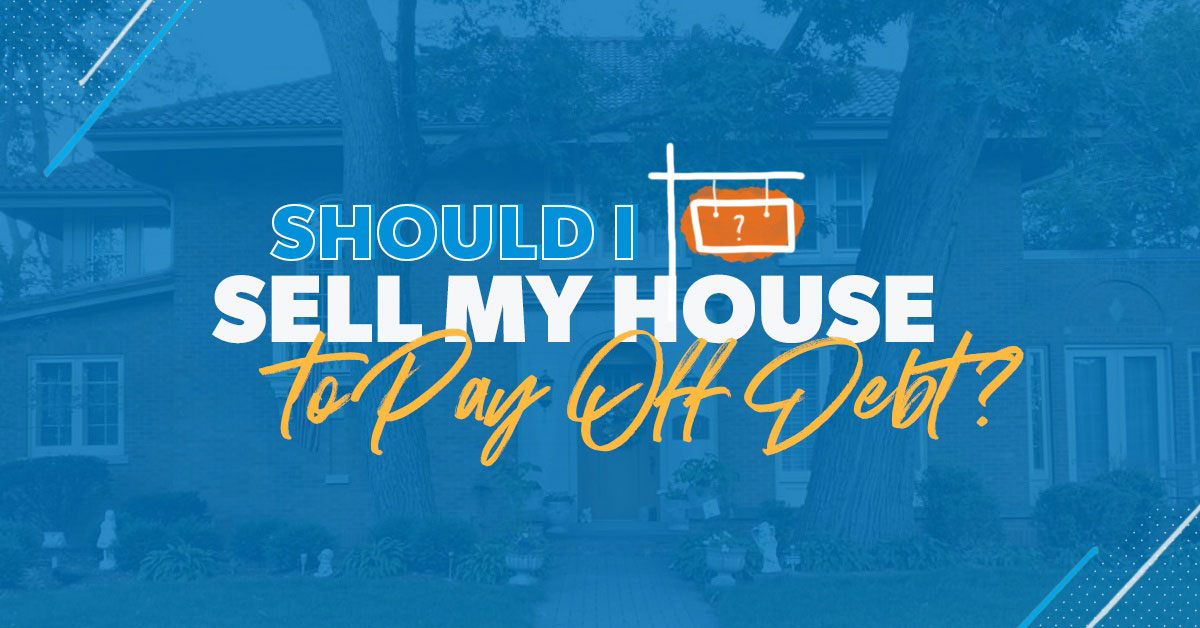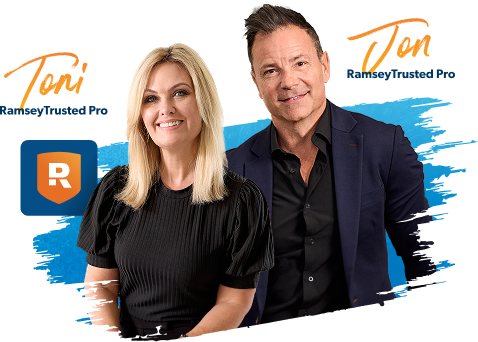Should You Sell Your House to Pay Off Debt?
8 Min Read | Mar 21, 2025

Getting out of debt is tough. Once you’ve made up your mind and are sick and tired of all the payments and the stress, it’s going to take a lot of work to clean up that financial mess—from working extra jobs to eating beans and rice to keep your living costs down.
And that might also include selling some stuff that you may have a hard time parting with. But let’s face it . . . your beloved motorcycle isn’t doing you any favors sitting in the garage. If you want to get out of debt, you’ve got to start selling so many things your kids will think they’re next!
But does selling everything include selling your home? Well, it depends. Selling your home is an expensive undertaking, both financially and emotionally. Here are some things to keep in mind if you’re considering selling your home to pay off debt.
Key Takeaways
- Selling your home is a hard process (both financially and emotionally) and should be a last resort to pay off debt only when all other options have been exhausted.
- There are only two situations when selling your home to pay off debt is a worthwhile option: your mortgage payment is too big or you were going to move anyway.
Before You Sell the House
Depending on how big your debt is, it’s true that the proceeds from a home sale will probably take a huge bite out of your debt—or even pay it off. That sounds great!
However, because selling your home is such a huge (and expensive) process, it’s not something to go into on a whim. That’s why, when it comes to paying off debt, selling your house should always be a last resort. In other words, you should exhaust all the alternatives before considering it.
So, before you think about selling your home to pay off debt, ask yourself a few questions—and be honest:
- Are you putting every incoming dollar you can spare toward paying off your debt? That means draining savings (except for a $1,000 starter emergency fund) and temporarily stopping any investments (including retirement).
- Are you finding ways to boost your income? Take an extra job delivering pizzas or drive for Uber for a little while. Do anything you can to get more money coming in and chip away at that debt.
- Have you adjusted your budget to maximize debt payments? We’re talking no restaurants (unless you’re working in one) or any other spending outside the Four Walls (food, shelter, utilities, transportation). And that also means sticking to your revamped budget!
- Have you sold everything else you can? Don’t sell the kids, but what about anything else not nailed down, like that mixer you got as a wedding present that’s collected dust for years or the motorcycle we mentioned earlier? Nothing should be off the table.
- How long have you been paying off debt? If you’re just starting out on your debt-free journey, you might want to try it for a year and see how it goes before doing something as drastic as selling the house. Use our Debt Snowball Calculator to determine how long it’ll take you to pay everything off and that’ll give you some perspective.
When you’ve exhausted all those options, have been at it for a while, and are still wanting (or needing) to put more toward debt, selling your home might be an option. But even then, there are two circumstances where it would actually make sense.
Your Mortgage Payment Is Way Too Big
These days, mortgage payments can be pretty big. In fact, according to the Mortgage Bankers Association (MBA), the median mortgage payment in the U.S. is $2,140.1 And if it’s too big, it can keep you from making progress on your debt.
Find expert agents to help you sell your home.
Ideally, your mortgage payment should be no more than 25% of your monthly take-home pay. If half of your income gets swallowed up by your mortgage every month, it’s a no-brainer—there’s nothing left to throw at debt. Cutting your housing budget down to size is the only way you’ll ever make progress.
Let’s look at an example.
Frank and Sheryl Smith bring home $4,900 a month and owe $40,000 in student loans. Their mortgage costs $2,200 a month—a whopping 45% of their take-home pay. At this rate, they can only afford to put $350 a month toward their student loan debt.
So, the Smiths decide it’s time to sell their home and get in touch with a real estate agent. Because they hadn’t built up very much equity in the short time they were in their house, the Smiths make $20,000 off the sale when all is said and done. And that chunk of money goes directly toward their student loan balance.
Frank and Sheryl don’t have any cash to put down on a new home. Going back to renting isn’t ideal, but it’s worth a temporary sacrifice to get their financial feet back on the ground. The Smiths find a place to rent for $1,700 a month. That budget change enables them to add an extra $500 to their student loan payment each month.
Instead of taking five years to pay off debt, the Smiths are on track to kick Sallie Mae to the curb in just 24 months. And that’s not even counting any raises they get or temporary increases in income from side gigs and selling stuff. Not to mention the interest they’ll be saving on that loan by paying it off earlier.
Buy or Sell Your Home This Spring With Confidence
Now is a great time to buy or sell your home. Get ahead of the competition with help from a pro who’ll fight for you to get the best deal.
You’re Considering Moving Anyway
It’s true that your home holds a lot of emotional value. There’s no need to make a drastic move if you love your home and your mortgage payment isn’t holding you back. Like we said earlier, just tighten up spending in other areas and focus on attacking that debt. You can find other ways to turbocharge your progress without uprooting your family.
But if selling your home was already on your to-do list, there’s an important question to consider: Will it help or hurt your money situation? The answer takes a little calculation as well as our new (hypothetical) friends, Frank and Cheryl.
- First, let’s figure out whether the Smith’s home is worth more than they owe. We can do that by subtracting their mortgage balance from their home’s market value. For instance, if they owe $250,000 on their home and it’s worth $450,000, you’d have $200,000 in equity.
- Next, estimate their closing costs. These cover fees like agent commission, title insurance, and prorated interest and taxes. According to the National Association of REALTORS® (NAR), they can total 2–7% of your home’s sale price.2 For our example, we’ll deduct $31,500 for potential closing costs. That leaves Frank and Cheryl $168,500 to work with.
- Before they can go out and spring for a new home, let’s make sure they can afford it. We recommend putting at least 10–20% down on a 15-year fixed-rate mortgage (5–10% down for first-time homebuyers). Remember not to spend more than a quarter of your income on your mortgage each month.
Now let’s see how far $168,500 could go for the Smiths if they owe $40,000 in debt and want to downsize their home. And while they’re at it, why not use that chunk of change to power through the first three Ramsey Baby Steps to financial peace in one fell swoop? They could:
- Knock consumer debt down to zero,
- Build up their emergency fund (3–6 months of expenses),
- And put 20% down on a $400,000 home—paying about $3,000 a month on a 15-year mortgage.
|
Pay down debt |
$40,000 |
|
Build emergency fund |
$48,500 |
|
Put 20% down on a new home |
$80,000 |
|
Total |
$168,500 |
Of course, everyone’s financial situation is different. What works for the Smiths may not work for you. That’s why it’s important to crunch your own numbers before making a big decision.
Think It’s Time to Sell?
If you’ve determined that selling your home may be your best option for getting out of debt and need more info about the process, start with our free Home Sellers Guide for more tips on everything from finding the right real estate agent to planning a competitive pricing strategy. And did we mention that it’s totally free?
When it comes time to actually look into selling, you’re going need someone by your side to guide you through the process—and that’s where an experienced real estate agent comes in. For starters, you can ask a local agent to provide a comparative market analysis (CMA). This free report will show you what recent buyers have paid for homes like yours in your area. That way you can feel confident you have enough equity to make moving worth your while.
But we’re not talking about just any real estate agent. Call on one of our RamseyTrusted® agents. Selling your home is a taxing situation emotionally and financially. Talk to someone who will genuinely care and give you the information and service you need to make a successful sale.
Next Steps
- Take a hard look at your options for paying down debt.
- Download the free Home Sellers Guide and get the basics about the process to determine if it’s right for you.
- Do a mock budget and see if selling is even worth the time, expense, and emotional toll.
- If you do all that and still think that selling the house is your best option to pay off debt, talk to a RamseyTrusted agent in your area who will walk you through the process.
Did you find this article helpful? Share it!

We Hear You!
We’re considering adding the ability to save articles to your Ramsey account.




